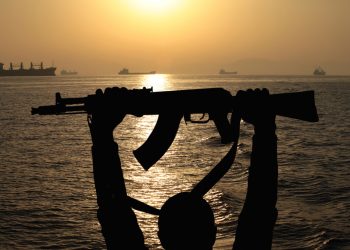Human Cost of Piracy off Somalia Coast Incalculable
 Fuelled by more than $150 million in ransom payments last year, Somali-based pirates were extending their deadly reach farther out into the Indian Ocean, senior United Nations officials said today, as they urged the Security Council to consider a full range of legal, judicial and preventive measures to thwart their brazen attacks.
Fuelled by more than $150 million in ransom payments last year, Somali-based pirates were extending their deadly reach farther out into the Indian Ocean, senior United Nations officials said today, as they urged the Security Council to consider a full range of legal, judicial and preventive measures to thwart their brazen attacks.
Presenting the Secretary-General’s report on specialized anti-piracy courts in Somalia and other States in the region, Under-Secretary-General for Legal Affairs and Legal Counsel Patrician O’Brien said the human cost of piracy off the Somali coast was “incalculable”, with killings and widespread hostage-taking. Although the numbers of incidents had declined in 2011, there were nevertheless 265hostages being held at the end of the year. Increasing levels of violence and the expanding geographical scope of the attacks were all extremely worrying.
She said that the United Nations Office on Drugs and Crime (UNODC) and the United Nations Development Programme (UNDP) had conducted detailed consultations with the relevant police, prosecution, judicial and prison authorities in the concerned regional States. Indeed, a great deal was already being done to ensure the prosecution of piracy suspects. A total of 20States worldwide were prosecuting, or had prosecuted, a total of 1,063piracy suspects since 2006. Of that total, more than 900of the suspects had been prosecuted in 11States in the region. Of those, five – Somalia, Seychelles, Kenya, Mauritius and the United Republic of Tanzania – were prosecuting piracy suspects with United Nations assistance, or were seriously considering doing so.
She said that those States and others in the region that conducted piracy prosecutions had taken on a heavy responsibility that entailed a commitment of national resources and security risks. It was key that the international community both acknowledged that important prosecution role and matched their commitment with strong international support. Indeed, if international assistance was maximized, therefore, up to 1,250piracy suspects could be processed yearly in accordance with international standards. The potential was for more suspects to be prosecuted per year in the five regional States than the total number of piracy suspects prosecuted globally since 2006, and at a cost that was “modest compared to that of any of the existing international or hybrid tribunals”, she explained.
As for the scope of the Secretary-General’s report, she recalled that the Council, in resolution 2015 (2011), had requested Somalia and other regional States that were willing to do so to establish specialized anti-piracy courts, or domestic courts. The Council’s request did not expressly mention the possibility of a Somali specialized anti-piracy court sitting extraterritorially in the territory of another State, and the current report reviews a proposal for a national Somali court. The term “specialized anti-piracy court”, was used in the report to refer to a court operating under national law, with international assistance, and with a focus on the prosecution of piracy cases.
Briefing the Council on the inter-agency efforts to address the complex issue of piracy off the coast of Somalia, Yury Fedotov, Executive Director of the UNODC, said pirates had netted about $170million in ransom for hijacked vessels and crews last year, up from $110million in 2010. The average amount paid to pirates in 2011 was about $5million, although $10million had been paid for the release of one tanker. He said that the ransom money from piracy was flowing into the legal financial system at an increasing rate.
Continuing, he said the money was also being reinvested into other criminal activities and that drugs, weapons and alcohol smuggling, as well as human trafficking, also benefitted from the proceeds. Although UNODC was unaware of an ideological link between Al-Shabaab rebels and pirates, there was strong evidence of cooperation in furtherance of the aims of the two groups. “Therefore, piracy is creating a clear threat to the stability of the region,” he said, noting that UNODC’s Global Programme against Money Laundering, Proceeds of Crime and the Financing of Terrorism was engaged in cooperation with other United Nations agencies and Member States within Working Group 5 of the Contact Group on Piracy off the Coast of Somalia.
He said that UNODC’s Counter-Piracy Programme was providing support to regional countries agreeing to undertake prosecutions. The agency was also carrying out extensive training programmes for police, prosecutors, judges and prison personnel in Kenya, Seychelles and Mauritius, as well as within Somalia, when security allowed. That programme, which had begun in 2001 with $500,000, would this year be implementing some $16million worth of technical assistance programmes. In addition, UNODC’s Piracy Prisoner Transfer Programme supported the transfer of convicted pirates back to Somalia to serve their sentences, while ensuring that prison conditions met international standards. Overall, he said, the issue of piracy required a strong inter-agency approach that addressed not only law enforcement and judiciary aspects of the problem, but also its root causes, in Somalia itself, as well as in the world’s financial centres.
When Council members took the floor, the representative of the United Kingdom agreed that to “break the piracy business model” it was necessary to employ a comprehensive approach that tackled it directly and its root causes on land. He noted that piracy would be one of the main topics of discussion tomorrow at the London conference on Somalia, which would be hosted by Prime Minister David Cameron. He said the Secretary-General’s report highlighted serious capacity constraints in Somalia, and prosecution by regional States had, therefore, been instrumental in counter-piracy efforts.
“We believe this continues to be the most effective way to prosecute pirates in the short term,” he said, adding that, while the United Kingdom supported, in principle, the report’s implementation proposals to increase capacity through specialized anti-piracy courts in Somalia, continuing the broader exercise of building regional capacity remained essential. He said that the threat of piracy, the effects of the famine and terrorism in Somalia were all symptoms of one central problem: the breakdown of the Somali State. Tackling piracy and its causes could not be separated from that fact, and the international community needed to address the on-land issues that fed criminality at sea, including through deterrence, security and the rule of law.
The representative of the Russian Federation said that, while his Government was interested in studying the root causes of piracy off the coast of Somalia, ambiguity remained in important aspects regarding measures to counter the threat, such as legal proceedings, detention, transport, and data collection. He said he attached great importance to the strong judicial and law enforcement capacities of the countries of the region.
According to the Secretariat, if the international community continued to support current prosecution mechanisms over the next two years, the situation would turn around, but he did not see a basis for such optimism. The resources of coastal States were limited, and even with intense aid, those States could not deal with the number of pirates, and that was illustrated by the data in the report.
He believed future additional measures were necessary for the prosecution of pirates, but mindful that the foundation of anti-piracy justice mechanisms was to be found in national bodies of the justice systems of the States of the region. Given the limited financial capacity, it would be advisable now to concentrate efforts on establishing anti-piracy legal mechanisms with international participation in those countries that demonstrated “absolute readiness” to implement such measures.
Also speaking today were the Minister for Foreign Affairs and Cooperation of Togo, as well as representatives of India, Morocco, United States, Colombia, China, Portugal, Guatemala, France, Pakistan, Germany, Azerbaijan and South Africa.
Source: UN News





























































